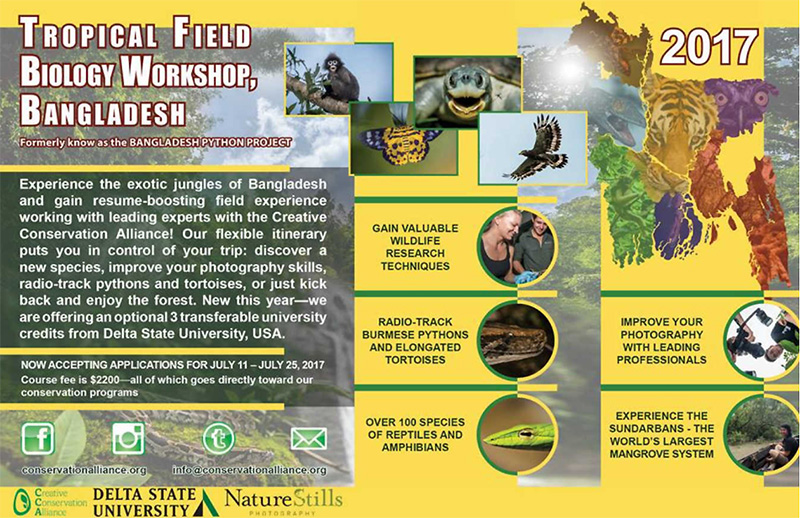
Dr. A.H.M. Ali Reza, assistant professor of biology at Delta State, is leading another international field course this summer in his homeland of Bangladesh.
The tropical field biology study abroad course is in partnership with the Creative Conservation Alliance (CCA), an NGO that works tirelessly to conserve Bangladesh’s imperiled wildlife.
“This is really a special opportunity for students to get direct access to one of the most diverse environments in the world, the jungles of Lawachara National Park, as well as the largest mangrove forest in the world, the Sundarbans Reserve Forest.” said Reza. “I would strongly encourage students to consider joining this trip if they have an interest in resume-boosting conservation field experience. You’ll have a real chance at seeing tigers, saltwater crocs, five species of primates, and finding dozens of snakes in a single night.”
Students at Delta State will have the opportunity of gaining three credits during the Summer II session with a two-week field trip mandatory for the course, from July 10-25. BIO 492: Tropical Field Biology, is course appropriate for any student enrolled or interested in biology, natural resources management, conservation biology, wildlife ecology, management, veterinary sciences or related fields.
Students enrolled in other universities or colleges in the U.S. will also be able to transfer course credits from Delta State to their home institution.
Thanks to the partnership with CCA, the course fee of $2,200 per student directly contributes to the conservation of the endangered flora and fauna of Bangladesh. The fee also covers housing, meals, local travel and fees to the forests. Separate from the course fee, students will be responsible for their airfare to Bangladesh.
Taking the course for university credit is optional. The fee to take the trip for credit is an additional $802.50.
“While we encourage everyone to enroll for academic credit on this trip, students or anyone else can attend without registering for credit,” added Reza.
Reza said this hands-on experience can help students get recognized in the scientific field.
“You have a great chance of getting your name on a scientific publication by making a range extension, or even discovering a new species,” he said. “Our 2014 and 2015 trips recognized multiple potentially new species and made several range extensions. In 2016, our group discovered a new species of a Takydromus lizard.”
For more trip information, contact Reza at areza@deltastate.edu.

